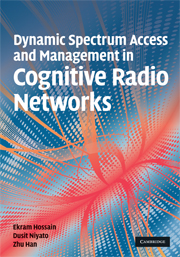Book contents
- Frontmatter
- Contents
- Preface
- Part I Introduction
- Part II Techniques for design, analysis, and optimization of dynamic spectrum access and management
- 3 Signal processing techniques
- 4 Optimization techniques
- 5 Game theory
- 6 Intelligent algorithms
- Part III Dynamic spectrum access and management
- References
- Index
5 - Game theory
from Part II - Techniques for design, analysis, and optimization of dynamic spectrum access and management
Published online by Cambridge University Press: 26 February 2010
- Frontmatter
- Contents
- Preface
- Part I Introduction
- Part II Techniques for design, analysis, and optimization of dynamic spectrum access and management
- 3 Signal processing techniques
- 4 Optimization techniques
- 5 Game theory
- 6 Intelligent algorithms
- Part III Dynamic spectrum access and management
- References
- Index
Summary
The ideas underlying game theory have appeared throughout history, in the Bible, the Talmud, the works of Descartes and Sun Tzu, and the writings of Chales Darwin. Modern game theory, however, can be considered as an outgrowth of three seminal works:
Augustin Cournot's Research into the Mathematical Principles of the Theory of Wealth in 1838 gives an intuitive explanation of what would eventually be formalized as the Nash equilibrium, as well as provides an evolutionary, or dynamic notion of best-response to the actions of others.
Francis Ysidro Edgeworth's Mathematical Psychics demonstrated the notion of competitive equilibria in a two-person (as well as two-type) economy; Emile Borel, in “Algèbre et calcul des probabilités,” Comptes Rendus Académie des Sciences, vol. 184, 1927, provided the first insight into mixed strategies that randomization may support a stable outcome.
While many other contributors hold a place in the history of game theory, it is widely accepted that modern analysis began with John von Neumann and Oskar Morgenstern's book, Theory of Games and Economic Behavior. Then building on von Neumann and Morgenstern's results John Nash developed the modern framework for methodological analysis.
Depending on the nature of the different approaches, there are different possible applications of game theory. If the information is strictly limited to local information, the non-cooperative game might be the only choice for each individual to play. However, such a game might have a very low-efficiency outcome. To overcome this problem, pricing or referee approaches have been proposed. If the users care about long-term benefits, the repeated game can be employed to enforce cooperation by the threat of future punishment from others.
- Type
- Chapter
- Information
- Publisher: Cambridge University PressPrint publication year: 2009



